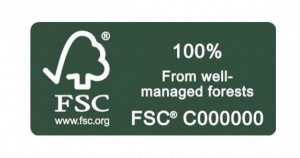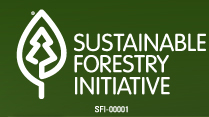by John Pumilio, director of sustainability
When making purchasing decisions, we are often faced with many choices for the same product. Take paper, for example. Deciding on what paper to purchase can be overwhelming. A simple search for 8.5×11 printer/copier paper on the W.B. Mason website, will give you dozens of choices. In the end, each of us makes our decisions based on a number of preferences. For example, price and quality may be priorities for some while environmental sustainability may be important to others.
For several years now, Colgate has had an institution-wide preference to purchase recycled content and/or Forest Stewardship Council (FSC) certified paper.
We hope this post will help you find the most environmentally responsible paper while also keeping in mind cost and quality. But first, you may want to know that W.B. Mason labels certain products as “Green Items” on their website, when in fact they may not be sustainable products. The “Green Item” logo W.B. Mason uses is loosely defined, has no quality control, and is not a third-party certification.
Be wary of this Green Item logo from W.B. Mason:
![]()
Keeping this in mind, here are a few criteria to consider when choosing paper that is best for you:
- Post-Consumer Recycled Content Paper. Paper that was previously a cardboard box, newspaper, magazine, printer/copier paper, notepad, or any other paper product that was used by someone else before being recycled and processed into something new for you. Paper made with post-consumer recycled content ultimately relies on fewer forests that must be cut down to feed the demand for virgin paper. In sustainability circles, post-consumer content paper is preferred over recycled content paper.
- Recycled Content Paper. Paper made from recycled content (sometimes labeled as pre-consumer recycled content), is made from manufacturer waste that never actually made it to the consumer for one reason or another. Manufacturer waste such as scraps, rejects, or trimmings that end up on the factory floor is repurposed into something new rather than trashed. Pre-consumer recycled content paper saves precious resources but is still not as good as post-consumer recycled content paper.

Forest Stewardship Council. Look for this logo when purchasing paper at Colgate University.
- FSC Certified Paper. The Forest Stewardship Council (FSC) and the Rainforest Alliance certify environmentally appropriate, socially beneficial, and economically viable management of the world’s forests.
- SFI Certified Paper. The Sustainable Forestry Initiative (SFI) is another certification that helps the consumer choose paper products from well-managed forests. In many sustainability circles, SFI is not viewed as favorably as FSC. SFI was formed by the American Forest and Paper Association, an industry group. Still, SFI certification is better than nothing.

Sustainable Forestry Initiative. A good second-option if FSC certified paper is not available.
Finally, here are a few choices for paper that can be ordered through W.B. Mason and are preferred by the Sustainability Office.
TOP CHOICES:
Boise® ASPEN® 100 Recycled Copy Paper, 100% Post-Consumer Content, 8-1/2″ x 11″, 500/RM
W.B. Mason Item: CAS054922
Price: $9.86 RM
Post-Consumer Recycled Content Percent = 100%
Total Recycled Content Percent = 100%
FSC Certified = Yes
Boise® ASPEN 50% Multi-Use Recycled Paper, 92 Bright, 20lb, 8 1/2 x 11, White
W.B. Mason Item: CAS055011
Price: $36.85 CT (5,000 sheets)
Post-Consumer Recycled Content Percent = 50%
Total Recycled Content Percent = 50%
FSC Certified = Yes
ALTERNATIVES:
Boise® ASPEN® 30 Recycled Copy Paper, 30% Post-Consumer Content, 8-1/2″x11″, 500/RM
W.B. Mason Item: CAS054901
Price: $7.79 RM
Post-Consumer Recycled Content Percent = 30%
Total Recycled Content Percent = 30%
SFI Certified = Yes
Hammermill® Great White® Recycled Copy Paper, 30% Post-Consumer Content, 8 1/2″x11″, 500/RM
W.B. Mason Item: HAM86700
Price: $8.92 RM
Post-Consumer Recycled Content Percent = 30%
Total Recycled Content Percent = 30%
SFI Certified = Yes
Blizzard™ Blinding White Copy Paper, 8 1/2″ x 11″, 98 Bright, 500/RM
W.B. Mason Item: BLZ41200
Price: $7.51 RM
Post-Consumer Recycled Content Percent = 0%
Total Recycled Content Percent = 0%
FSC Certified = Yes
Super Star™ Heavy Copy Paper, 8 1/2″ x 11″, 24 lb., 98 Bright, 500/RM
W.B. Mason Item: STR91200
Price: $13.15 RM
Post-Consumer Recycled Content Percent = 0%
Total Recycled Content Percent = 0%
FSC Certified = Yes
mycopy™ Paper, 8 1/2″ x 11″, 20 lb., 98 Bright, 500/RM
W.B. Mason Item: MYP81200
Price: $7.51 RM
Post-Consumer Recycled Content Percent = 0%
Total Recycled Content Percent = 0%
FSC Certified = Yes
myface™ Professional-Grade Paper, 8 1/2″ x 11″, 28lb., 100 Bright, 500/RM
W.B. Mason Item: MYP88811
Price: $14.09 RM
Post-Consumer Recycled Content Percent = 0%
Total Recycled Content Percent = 0%
FSC Certified = Yes
IF YOU MUST:
Hammermill® Inkjet Paper, 96 Brightness, 24lb, 8 1/2 x 11, White, 500 Sheets/Ream
W.B. Mason Item: HAM105050
Price: $8.45 RM
Post-Consumer Recycled Content Percent = 10%
Total Recycled Content Percent = 10%
SFI Certified = Yes
Flagship™ Copy Paper, 8 1/2″ x 11″, 20lb., 92 Bright, 500/RM
W.B. Mason Item: WBM21200
Price: $6.57 RM
Post-Consumer Recycled Content Percent = 0%
Total Recycled Content Percent = 0%
SFI Certified = Yes
AVOID:
Blizzard™ 78™ Extra Bright & Heavy Copy Paper, 8 1/2″ x 11″, 22 lb., 98 Bright, 500/RM
W.B. Mason Item: BLZ78200
Price: $11.55 RM
Post-Consumer Recycled Content Percent = 0%
Total Recycled Content Percent = 0%
FSC Certified = No
Between 2012 and 2014, Colgate’s employees avoided purchasing non-recycled paper on campus. Congratulations! In 2015, we experienced a setback where Colgate employees reduced the purchase of recycled paper in exchange for non-recycled paper. We can do better!

Colgate University’s paper purchases, 2011 – 2015
We realize there are many factors to consider when choosing paper that is most appropriate for you. We hope this post will help you find a brand of paper that is high-quality, environmentally conscious, and reasonably priced. Thank you for supporting our planet’s forests and Colgate’s sustainability goals!


